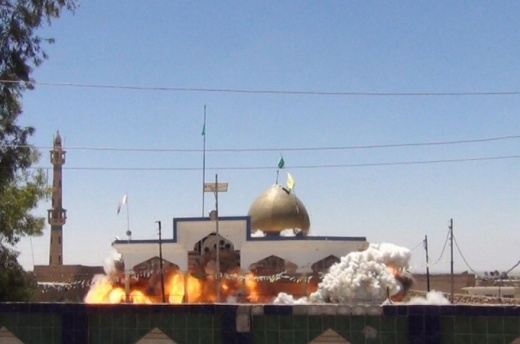Fighters from the Islamic State have demolished numerous Shia shrines and mosques in northern Iraq, according to photos published by the group on social media.
The images show Shia religious centres being attacked using bulldozers and explosives in the cities of Mosul and Tal Afar, in the northern province of Nineveh.
Al Jazeera cannot independently verify the authenticity of the images.
The Islamic State, which follows a strict interpretation of Sunni Islam, has previously claimed responsibility for destroying Shia shrines and pledged to rid Iraq of what it calls idolatry and disbelief.
The Islamic State has swept across much of northern and western Iraq, tapping into grievances among the country’s Sunni community with Nouri al-Maliki, the prime minister, and his Shia-led government.
Maliki has promised to defeat the rebels, and suggested that he will not step down despite pressure for him to do so.
Speaking on Friday, Maliki said: “Pulling out of the battlefield while facing terrorist organisations that are against Islam and humanity would show weakness instead of carrying out my legitimate, national and moral responsibility.
“I have vowed to God that I will continue to fight by the side of our armed forces and volunteers until we defeat the enemies of Iraq and its people.”
Maliki defiant
Alluding to the debate over his future, Maliki sought to remind Iraqis, including his political rivals, that voters handed his State of Law bloc the most seats in parliament in April’s elections, and that he must “stand by them during this crisis that Iraq is passing through”.
Maliki, who has held the post since 2006, is being pressed to step aside, with even some of his former allies blaming his failure to promote reconciliation for fuelling Sunni support for the rebellion in Iraq’s north and west.
Map: The Islamic State’s (formerly ISIL) path through Iraq
Ayatollah Ali al-Sistani, Iraq’s most revered Shia religious leader, has pressed politicians to quickly form a new government that can confront the Sunni-led rebellion and unite the country.
On Friday, he lamented the inability of political leaders to quickly agree on a new prime minister, describing it as a “regrettable failure”, putting further pressure on Maliki.
Several Sunni and Kurdish legislators walked out of a chaotic session on Tuesday, which was marred by threats and acrimony.
In Friday’s other developments, a suicide car bomber hit an army headquarters in Owainat, south of Tikrit, killing 12 people and injuring 27 others, agencies reported.
Tikrit has been the scene of violent clashes between army forces and rebel fighters, with sporadic skirmishes breaking out throughout the week.
Iraqi officials have said troops had reached the outskirts of Tikrit and even pressed deep into the heart of the city, but residents claimed the rebels were were still in control.
Symbolic victory
The Iraqi army has been trying to recapture large swathes of territory lost to the Sunni-led rebellion and, on Friday, scored a symbolic victory by retaking Awja, the birthplace of Iraq’s late president, Saddam Hussein.
Maliki’s military spokesman said Awja had been “totally cleansed”, with 30 fighters killed, and was part of an ongoing military offensive that ultimately aims to retake Tikrit.
The army said it now held the 50km stretch of highway running north from the city of Samarra to Awja.
But the mainly Sunni communities along this corridor remain hostile towards government forces, and army convoys continue to come under guerrilla attack.
In the town of Hawija, members of local Sunni tribes told Reuters news agency that community members had organised to fight against the Islamic State’s control of the town.
Members of the al-Obaidi tribe were angered by the Islamic State’s seizure of homes of local sheikhs and officials, and had formed an armed group to fight the group.


